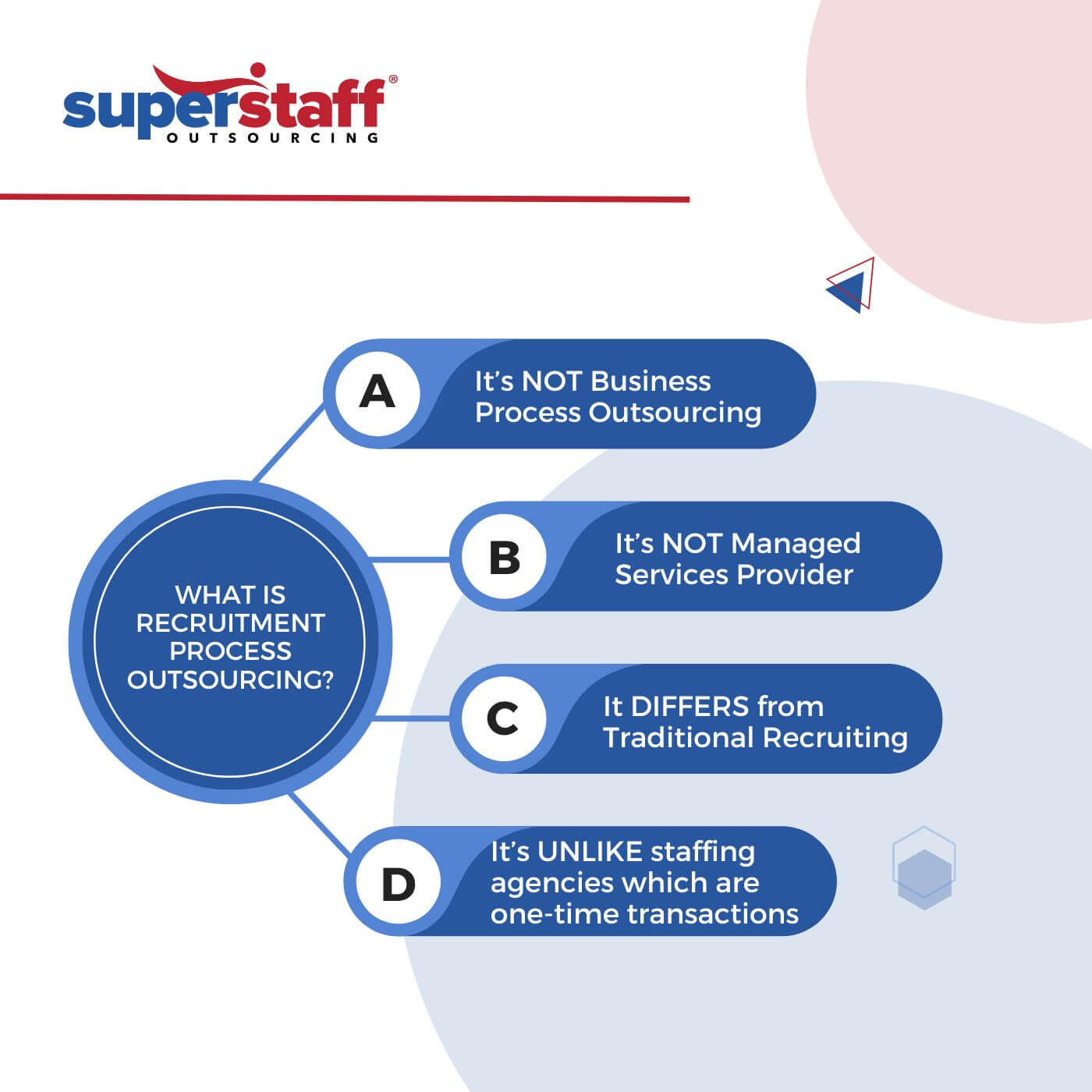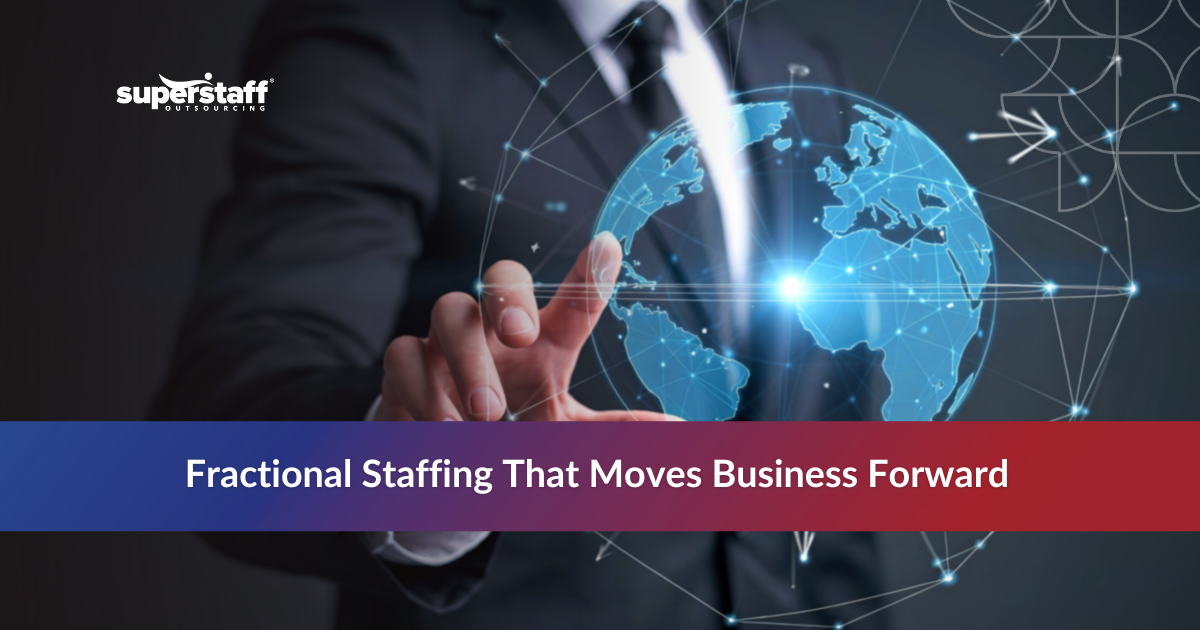
Businesses across the country are hiking wages to meet hiring demands amid the ongoing labor shortage. However, higher salaries and incentives are no longer enough to attract talent in this red-hot job market.
Companies need to rethink their hiring process and recruitment strategies. One way is with recruitment process outsourcing or RPO.
1. What is recruitment process outsourcing?

Recruitment process outsourcing (RPO) is a workforce solution that allows you to contract all or part of your recruitment processes to a third-party specialist.
RPO providers are experts in talent acquisition who implement scalable solutions designed to enhance your hiring processes and give you a competitive advantage against rival businesses. They leverage cutting-edge technology and a global talent pool to find the most qualified candidates based on a deep understanding of your staffing goals.
2. What is the difference between RPO and BPO?
RPO and business process outsourcing (BPO) differ in their services.
Consider an RPO provider as your remote team of talent scouts and recruiters. On the other hand, a BPO firm builds teams for front and back-office support roles. Popular BPO solutions include customer service and tech support.
3. What is the difference between Recruitment Process Outsourcing (RPO) vs. Traditional Recruiting?
Traditional recruiting only fulfills your short-term recruitment goals. It fills positions ad hoc and only involves finding talents, not onboarding, much less improving your staffing process.
On the other hand, an RPO provider takes a more holistic and proactive approach to growing your workforce. Their job goes beyond filling empty cubicles.
RPO firms use their expertise and data insights to address pain points in your hiring process and help strategize your workforce planning. Their data allows your organization to grow organically, not just in headcount.
4. How do RPO and staffing agencies differ?
When you work with staffing and recruitment agencies, it’s a one-time transaction, but investing in RPO solutions is a long-term talent acquisition strategy.
Agencies only make placements. Once they’ve connected the employer with the candidate, their involvement stops. They exist solely to fill vacancies and have little regard for your company’s recruitment funnel.
RPO firms are dedicated to all your recruitment and hiring needs. From finding talent to onboarding, your partners are there with you every step of the way.
On top of getting new hires, you also leverage the expertise and technology of RPO providers. RPO firms will collaborate with your talent acquisition team and hiring managers, guiding every staffing and recruitment decision you make with talent analytics and industry knowledge. They are deeply involved in workforce planning, but they ensure that you still have control over who gets hired and how it gets done.
Most importantly, the return on investment is much higher with RPO than it is for staffing agencies. Agencies are only concerned with bringing you people, while RPO professionals have a three-pronged objective:
- Increase your hiring rate.
- Reduce your cost-per-hire and time to hire.
- Cut down your churn rate by hiring quality talent.
5. What’s the difference between Recruitment Process Outsourcing (RPO) and Managed Services Providers (MSP)?
A Managed Services Provider (MSP) is another company that handles talent acquisition. However, MSPs differ from RPO providers like staffing agencies and traditional recruiters.
MSPs and RPOs have two main differences. The first one is the type of employees they recruit for clients. RPO firms focus on permanent recruitment. They ensure that every new hire can make a real difference for your company.
Meanwhile, MSPs find talent for your short-term needs. They solely recruit contingent workers such as freelancers, contractual, temp workers, and other non-permanent employees for a specific project.
The two also differ when it comes to sourcing talent. MSPs use cloud-based software known as vendor management systems to field candidates.
RPO companies source candidates themselves. Using a unique combination of recruitment technology and industry expertise, they exhaust all platforms – social media, job boards, professional networks, and applicant databases – to find the perfect candidate for your position.
6. What are the differences between recruiting, staffing, and pooling?
Recruiting, staffing, and pooling may go hand-in-hand in building your workforce, but they are not interchangeable.
Recruitment happens in the early stages of acquiring talent. It pertains to attracting potential candidates and urging them to apply. On the other hand, staffing is a continuous management process encompassing everything from candidate applications to resignations.
Pooling candidates means building your database of potential employees. When applicants do not receive job offers, companies add them to a pool of qualified talent for other positions or future openings.
To better illustrate the difference between the three, consider this scenario: John was referred for a position in a new company, while Jane learned about it online. Let’s say that only Jane got an offer, and John was told he was shortlisted. In this scenario, while both were recruited, Jane was staffed, and John was pooled.
7. What are remote hiring and onboarding?
Remote Hiring
Remote hiring is the recruitment that isn’t limited to your area. Recruiters can hire overseas (offshoring) or near your location (nearshoring). This arrangement enables you to tap emerging markets with deep talent pools.
Even before the pandemic, countless companies were already recruiting remotely to find the best talent.
But as COVID-19 opened the possibilities for remote work, more companies are seeking talent overseas.
Remote Onboarding
Onboarding pertains to integrating new employees into the company.
This step involves three core aspects – the organizational, the technical, and the cultural.
As the term suggests, remote onboarding is done from a distance by leveraging technology. The setup can pose a challenge for teams because of the different time zones and lack of interaction, but digitalization makes it possible.
Online orientations with HR departments are one way to do organizational onboarding. New employees are typically provided with company handbooks to guide them about corporate guidelines.
Technical onboarding can be done remotely through video training and presentations, which refers to familiarizing employees with their tasks and work tools.
Meanwhile, cultural onboarding, which focuses on integrating new hires into the workplace, could be done through a conference call for a simple meet-and-greet with their team members.
8. How is RPO relevant to Candidate Care?

Candidate care is the treatment and respect we show applicants, beginning from the moment we post the job and extending to the time our recruitment process ends.
It’s the simple things we do to make our candidates feel how we value their time with us and their trust in our organization.
As recruiters, RPO talent experts establish their client base by dealing with people. They show genuine interest and address candidates’ concerns because they want to build lasting networks in the industry.
Bottom line: As businesses struggle with recruiting challenges in this tight labor market, applicants have the upper hand. A curt email reply or a rude receptionist could mean losing a great candidate to your competitor.
By entrusting your candidate care to an RPO provider, you can rest assured that your talent acquisition journey will showcase the quality of your employer branding.
9. Can RPOs help with volume hiring?
The best way to reduce the cost-per-hire in high-volume hiring without affecting the quality of hires is by investing in the right RPO solution.
Typically, as hiring volumes increase, so do the hiring costs. But this won’t be a problem with an RPO service provider. Outsourcing will provide you with the resources to streamline and expedite recruitment, allowing you to hire talent faster while ensuring the quality of your talent acquisition journey and employer branding.
10. Is an RPO partnership just for big companies?
Labor shortages spare no business, no matter the size.
As such, all businesses, from start-ups to large corporations, can and should take advantage of RPO services. This can help you develop a solid recruitment strategy and find top talent even if you don’t have the resources and expertise to do so.
11. What are some reasons organizations would outsource recruitment?
There are many reasons why businesses outsource their talent acquisition function. For instance, a company may need help due to high staff turnover, labor shortages, or limited resources. Another possible reason is that it needs to expand to reach its business goals.
The best recruitment solution for any staffing problems you may face is outsourcing. Apart from lower cost-per-hire, you will also benefit from value-added services such as recruitment analytics and talent marketing.
12. How can businesses thrive amid the global labor shortage with RPO?
Businesses are facing a labor shortage on an unprecedented scale. With the workers’ slow return to the labor market, companies are scrambling to fill vacancies and keep employees.
This situation raises the question: How can businesses survive – let alone thrive –in a post-pandemic landscape where building a workforce is a massive challenge?
The answer is investing in the right recruitment process outsourcing solution.
RPO allows organizations to hire employees from a pool of skilled talent overseas. Offshoring (overseas outsourcing) widens the network of available talent for your pipeline and gives you an edge over your competitors, who are limited to hiring onshore talent.
RPOs are not just about quantity but quality as well. Your RPO partner ensures the high caliber of talent they source using expert knowledge and innovative recruitment strategies.
Apart from delivering the best hires, RPO providers also draw insights to help you stay ahead of recruitment market trends to keep pace with the latest industry innovations and automate your recruitment practices.
An RPO provider offers everything from a vast talent pool to the latest recruitment technology while ensuring that their solutions can be customized and scaled to your needs.
13. What are the advantages of partnering with RPO firms in the Philippines?
While the Philippines is famous as the “BPO Capital of the World,” the country’s RPO industry is also thriving.
The country’s most crucial advantage is the deep pool of skilled Filipino talent.
As countries across the globe struggle with a labor crisis, the Philippines boasts a booming working-age population of over 110 million in 2021 alone. Most are college graduates and skilled professionals seeking work.
Grow Your Workforce With Recruitment Process Outsourcing (RPO)
Recruitment is the biggest challenge businesses face in the post-pandemic era. Don’t let this stand in the way of your growth.
With its access to a deep global talent pool, outsourcing drives and boosts your productivity at a comparative cost advantage.
SuperStaff, an industry leader in off-site recruitment, offers end-to-end RPO solutions to help companies find the right talent. Our team of HR professionals and recruitment experts can guarantee that every new hire will get you one step closer to reaching your future goals.






